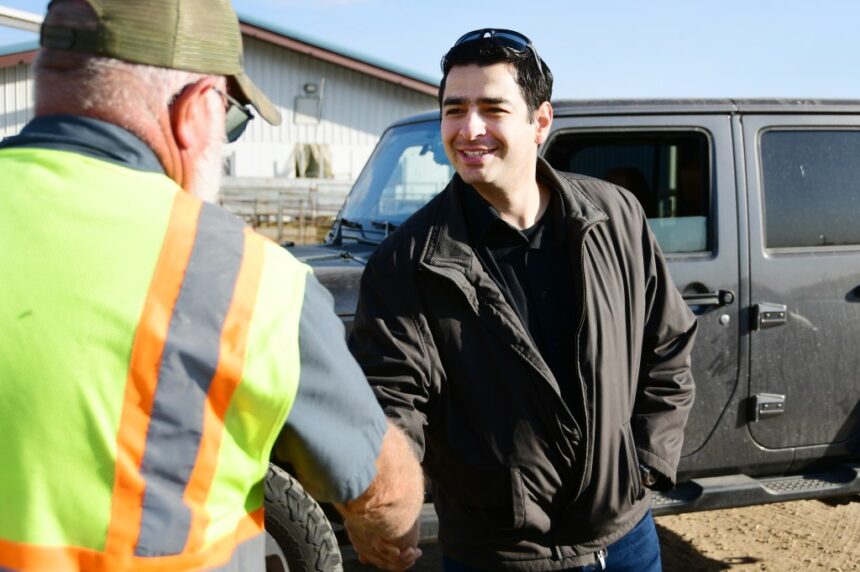At Donald Trump’s rally in a packed Aurora ballroom earlier this month, state Rep. Gabe Evans was among the first speakers to take the stage.
His three-minute speech was standard Evans: He listed several crime metrics about Colorado — high cocaine use, high auto thefts, high fentanyl deaths — and blamed the Democrats in charge. He told his personal story, about serving as an Army helicopter pilot and an Arvada police officer. He noted how tight he was running against Democratic U.S. Rep. Yadira Caraveo in the northern suburbs of the battleground 8th Congressional District — essentially tied a month before Election Day in a recent poll.
Compared to the other congressional candidates who spoke, his speech was free of the hyper-partisan rhetoric common at Trump events; he didn’t even touch on immigration.
Only once did Evans mention the former president and current GOP nominee: If I win, he told the crowd, it will help ensure Trump enters the White House with a Republican U.S. House majority in January.
The speech was emblematic of the campaign Evans has tried to run in his quest to unseat Caraveo in Colorado’s newest congressional district, one of the most-watched races in the country. In a district with more unaffiliated voters than registered Democrats and Republicans combined, it’s been a contest to see who can embrace moderation and paint their opponent as partisan and extreme.
The result for Evans, a freshman state lawmaker whose two years at the Colorado Capitol have featured criminal justice bills and anodyne-but-chipper filibuster speeches, has been shades of gray.
Where he previously signaled stronger anti-abortion stances, he now opposes a national ban in the post-Roe v. Wade era. He’s railed against the immigration status quo while trying to keep a measure of distance from Trump’s most extreme rhetoric.
He’s drawn criticism for refusing to directly answer some debate questions, including about corporal punishment for children, while touting his bipartisan success in a state House run by Democrats. And in a party dominated by election conspiracists, Evans has watered down his responses to questions about election integrity with hedged answers.
Asked in a recent radio interview if he was an “establishment” or a “grassroots” Republican, he described himself as a “Gabe Evans Republican.”
“I will legitimately work with anybody that’s interested in focusing on common-sense solutions that make our lives better, safer, more affordable,” Evans, who has a farm in southern Weld County, told The Denver Post in the conference room of a Commerce City engineering firm he was touring.
There’s good reason for moderation — and for seeking some distance from Trump: In 2022, when a handful of other contested federal races were won handily by Colorado Democrats — a sign of the state’s shift to solid blue — Caraveo beat her Republican opponent by just 1,632 votes, or less than a percentage point.
“He’s trying to be a candidate running a centered campaign rather than a pure partisan campaign,” said Robert Preuhs, a political science professor at Metropolitan State University of Denver. “He needs to continue to distance himself as much as he can on extreme issues.”
Road to the statehouse
Evans, a 38-year-old married father of two, has made his military and law enforcement career a key part of his campaign. That career is rooted in his upbringing.
An Aurora native and second-generation American, he was homeschooled through high school. In middle school, he was in an electives class with Kristi Burton Brown, who would go on to be the leader of the Colorado Republican Party when Evans first ran for office in 2022. Her family was close with the Evans family, and they went to church together. Burton Brown’s mother taught the electives class through a program Evans’ mother ran, she said.
“We both, I would say, really cared about American history, American politics and just the deeper issues of the day,” said Burton Brown, now at the conservative advocacy group Advance Colorado. “He’s someone who looked at issues, looked at problems and had a very active way of approaching them.”
Evans went on to Patrick Henry College, a small conservative Christian school in Virginia. He majored in strategic intelligence, which prepares students to “anticipate moral, ethical, and mission challenges in order to defend the security of the United States,” according to the college.
Military service runs on both sides of Evans’ family, he said. His grandfather, a Mexican immigrant, fought and was wounded in Europe during World War II. So when an Army recruiter turned up on campus during Evans’ sophomore year, “I was like, ‘Am I going to talk to that guy? I know he’s going to get me.’ ”
“He got me the third day,” Evans said.
Evans enlisted in the Army in 2007 and, after graduating, was commissioned as a lieutenant in 2009 via the ROTC within the Virginia Army National Guard. He learned to fly Black Hawk helicopters in Alabama before moving back to Colorado to serve in the state’s National Guard. He also joined the Arvada Police Department in 2011.
In 2012 and 2013, he said, he was deployed to the Middle East as part of Operating Enduring Freedom, and his unit performed “counterterrorism and stability operations” in several countries. He was discharged in 2019 as a captain and worked in law enforcement until he resigned in 2022 to run for the state House.
“I became absolutely powerless (as a police officer) because of the woke-leaning legislation that handcuffed my ability to take care of the citizens,” Evans said in a 2022 article published about his candidacy by Patrick Henry College.
Evans jumped into his first race on his own, without a nudge from a Republican official or activist, said Colin Larson, a former lawmaker from Littleton who helped lead House Republicans’ campaign efforts two years ago.
Larson set up a meeting with Evans to feel him out.
“He understood the small-p politics that go on at the Capitol and all that kind of stuff,” Larson said, describing Evans as levelheaded. He “struck me as someone who was going to be a team player in the caucus.”
During his two years at the Capitol, Evans has not been part of the most conservative wing of the small House Republican caucus. He hasn’t signed on to some of his more right-wing colleagues’ anti-abortion measures.
And nearly 62% of the bills he’s sponsored have passed a legislature controlled by Democrats, a fact Evans cites to bolster his moderate and I-will-work-with-anyone bona fides.
Questions about past positions — and Trump
But Democrats have sought to undermine those credentials, with outside groups spending millions of dollars to slam Evans in TV ads that, at times, misrepresent his current positions.
Critics have pointed to his earlier record on abortion, which included opposition in all cases except when the life of the mother was at risk. Evans now says he supports exceptions for cases of rape and incest as well, and he says he won’t support a national abortion ban in Congress.
Evans told The Post that he believes abortion debates should be left to the states, reflecting what has become a mainstream Republican position.
Democrats also have criticized Evans for a letter to the editor he wrote as a teenager criticizing same-sex marriage and likening it to incest. Evans has said his position has changed, and he told The Post that he planned to vote for this year’s Amendment J, which would strip anti-same-sex marriage language from the state constitution.
Evans caught attention early this year when, asked if the 2020 election was stolen from Trump, he answered: “No-ish.” At a debate this month, he said President Joe Biden won four years ago but added that there was interference related to suppression of the Hunter Biden laptop story.
Asked by a business owner at a recent campaign stop if Colorado had a problem with undocumented immigrants registering to vote, Evans replied: “Kinda.”
Opponents have sought to tie Evans to Trump, while pointing to Evans’ refusal to answer some questions at the recent debate as a sign of his unclear positions and false moderation.

“He’s unwilling to do anything that doesn’t support his dear leader,” Colorado Democratic Party chairman Shad Murib said. He pointed to Evans’ opposition to a bipartisan border security bill that Trump helped scuttle in Congress earlier this year.
Like Trump, Evans said he opposed the bill, which would have boosted funding for law enforcement and security while reforming parts of the asylum system, because it didn’t go far enough in “securing the border.”
Across his campaign, Evans has indeed prioritized immigration, saying he hears about it in 90% of his conversations with voters in a district that’s about 40% Latino or Hispanic.
He’s pledged to back Trump-era policies like building the border wall and reinstituting the “Remain in Mexico” policy, which required asylum-seekers to stay in Mexico while their U.S. immigration court process played out.
Family history influences immigration stance
Other Republicans noted Evans’ Latino heritage — a commonality with Caraveo — and its potential boost in the diverse district.
He has linked his family history to his politics: His grandfather, he’s said, earned his citizenship by fighting in World War II; he “did it right,” Evans said in a radio interview.
He also has said he wants to “streamline the naturalization and visa process so that properly vetted individuals who want to come to America and be contributing members of our great country can do so.”
“I grew up hearing the stories of how hard my abuelito and mom worked to achieve their American dream,” he wrote in an email to The Post, responding to a question about his background. “… We want America to prosper. And like many immigrant families, we also know we need a secure border and an orderly immigration process.”
Evans has not fully endorsed Trump’s call to deport all undocumented immigrations — Evans said criminals should be prioritized — and he wouldn’t commit at a recent debate to supporting or opposing Trump’s suggestion of using the National Guard to carry out those deportations.
In an interview, Evans sidestepped when asked if he thought Trump’s divisive influence would hurt him.
“(Trump) talks about the policies of, ‘Make us safe, make us affordable, secure the border,’ ” he said. “And I’ve always been somebody that focuses on policies, not personalities — and that’s why I can work with everybody the way I do work with people.”
Kyle Saunders, a political science professor at Colorado State University, said Evans’ campaign was similar in approach and strategy to state Sen. Barbara Kirkmeyer’s in her close 2022 race against Caraveo. A late September poll by Emerson College Polling showed the economy as the top issue of likely 8th District voters, followed by a virtual tie between housing and immigration.
What’s more, the poll also showed 12% of voters remained undecided.

“The approaches have been interesting, but they have been in line exactly with that Emerson poll,” Saunders said. “(Evans’ campaign is) hitting the issues — they’re hitting immigration, they’re hitting the economy.”
Evans has successfully neutralized one potential obstacle. When Caraveo won two years ago, a Libertarian candidate earned more than 9,000 votes — enough to have swung the election if enough of those voters had backed Kirkmeyer instead.
This year, Evans signed an amended “liberty pledge” with his would-be Libertarian opponent, who dropped out and endorsed him.
If Evans wins, Republicans will have a better shot at keeping their razor-thin majority in the U.S. House. And for Colorado Republicans, an Evans win would offer a rare sign that their party can still win consequential elections here.
“I could see there being an actual future for Republican ideas and center-right politics (in Colorado) if Gabe is the messenger — that’s how I view the race,” said Larson, the former state lawmaker. “For me, it’s more than a single federal representative. It’s having somebody in the state who could be the statewide face of the party that’s appealing.”
Stay up-to-date with Colorado Politics by signing up for our weekly newsletter, The Spot.
Originally Published:










